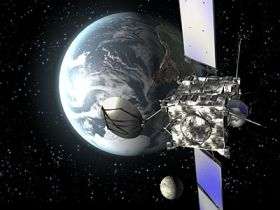Philae lander on comet may communicate again

European space scientists are hoping that they succeeded in maneuvering comet lander Philae into the sun and that it will resume communicating Saturday with recharged batteries.
The European Space Agency said the Philae lander, which has fallen asleep on comet 67P/Churyumov-Gerasimenko with its batteries depleted and not enough sunlight available, may communicate again Saturday at about 1000GMT (5 a.m. EST).
"From now on no contact would be possible unless sufficient sunlight falls on the solar panels to generate enough power to wake it up," ESA wrote on its blog early Saturday.
On Friday, controllers performed a rotation hoping to put the lander's solar panels out of a shadow, but they said they would not know until Saturday if they had succeeded.
Philae landed on the comet Thursday after a 10-year journey aboard the Rosetta space probe. Since alighting on the comet, which is some 311 million miles (500 million kilometers) distant from Earth, the lander has performed a series of tests and sent back reams of data, including photos.
On Friday, the spacecraft not only rotated itself to catch more sunlight, but also performed another tricky maneuver, drilling 25 centimeters (10 inches) into the comet to start collecting samples.
Material beneath the surface of the comet has remained almost unchanged for 4.5 billion years, so the samples would be a cosmic time capsule that scientists are eager to study.
Scientists hope the $1.6 billion (1.3 billion-euro) project will help answer questions about the origins of the universe and life on Earth.
Communication with the lander is slow, with signals taking more than 28 minutes to travel between Earth and Rosetta.
No matter how long Philae keeps talking to them, scientists say they already have gathered huge amounts of data and are calling the first-ever comet landing a roaring success.
"Let's stop looking at things that we could have done if everything had worked properly," flight director Andrea Accomazzo said Friday. "Let us look at things that we have done, what we have achieved and what we have on the ground. This is unique and will be unique forever."
© 2014 The Associated Press. All rights reserved.




















